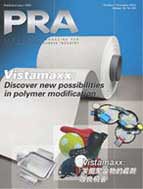 |
 |
In this Edition October 2011 |
LEAD FEATURE |
COMPANY NEWS |
MATERIALS NEWS |
MACHINERY NEWS |
INJECTION MOULDING ASIA |
RUBBER JOURNAL ASIA |
PRA October-November 2011 Electronic Issue Now Available |
Materials News
On the holy grail of creating "perfect plastics"
 |
The paper's authors form part of the Microscale Polymer Processing project, a collaboration between academics and industry experts which has spent ten years exploring how to better build giant macromolecules. These long tangled molecules are the basic components of plastics and dictate their properties during the melting, flowing and forming processes in plastics production.
Low-density polyethylenes (LDPEs) are used in trays and containers, lightweight car parts, recyclable packaging and electrical goods. Up until now, industry developed a plastic then found a use for it, or tried hundreds of different "recipes" to see which worked. This method could save the manufacturing industry time, energy and money.
The mathematical models used put together two pieces of computer code. The first predicts how polymers will flow based on the connections between the string-like molecules they are made from. A second piece of code predicts the shapes that these molecules will take when they are created at a chemical level. These models were enhanced by experiments on carefully synthesised "perfect polymers" created in labs of the Microscale Polymer Processing project.
The researchers say that as plastics production moves from oil-based materials to sustainable and renewable materials, the "trial and error" phase in developing new plastics could now be by-passed, "just by changing two or three numbers in the computer code to adapt all the predictions for new bio-polymer sources."
The research was carried out at the University of Leeds, Durham University, LyondellBasell and Dow Chemical and was funded by the Engineering and Physical Sciences Research Council and the European Union.
The Microscale Polymer Processing collaboration also includes researchers from the universities of Bradford, Cambridge, Nottingham, Oxford, Reading, Sheffield and University College London alongside their industry counterparts from Lucite International, Ineos, BASF, DSM and Mitsubishi.


